Bipolaruchiha - 💜💛💚
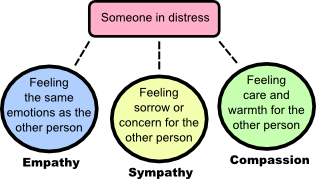
More Posts from Bipolaruchiha and Others
please dont use spoon theory terms unless you have physical disabilities / chronic pain/illness. the woman who came up with it used it as a metaphor for what it’s like to live with lupus, and as far as I know it’s not applicable to people who do not have physical disabilities or chronic pain/illness. if you do then carry on but otherwise please don’t.
shit, sorry, didn't know. that's my bad, i'll edit or delete my last stuff that used it. sorry!!
listen to me. thoughts do not have moral weight. a thought will never hurt anyone. the actions you take because of a thought can hurt yourself or other people, but the thought itself is powerless and there is no such thing as thought crime.
"but i have thoughts about being violent towards people! towards children! surely that makes me dangerous!" are you being violent? for real? with your actions? if not, then you are not actually hurting anyone
"but i have thoughts that are offensive and hurtful! they're bigoted, or they're horribly rude, or they're invalidating to others! i'm a horrible person." and what are you doing with those thoughts, exactly? are you taking bigoted actions, or saying those rude things, or taking steps to actually invalidate people? no? well then. no one is getting hurt. and in the meantime, if it really bothers you, doing things like helping unlearn your biases (both against minorities and just, like, against furries and theatre kids and shit) might help some of those thoughts go away, but sometimes you just get shitty thoughts.
"but i have horrific thoughts about sex!" are you hurting people. are you forcing people to do things they don't consent to. or are you just playing the upsetting possibility in your mind over and over again, and acting like that's even remotely the same thing?
thought. crime. is. not. real. OCD. is. hell. (and anything else that may cause intrusive thoughts.) but it does not define you. your thoughts will always, always come secondary to your actions. you're gonna be fine.
i feel like tumblr has kind of changed the meaning of the word "echolalia" into something that can be more precisely described with "vocal stimming." people on here use echolalia to mean "repeating a word or phrase over and over because it feels good" which fits the definition of vocal stimming. that's the established term for doing that; echolalia usually means something else.
the classic meaning of echolalia isn't repeating a word that sounds good, but is actually a conversational pattern where one person repeats the last thing that got said. for example, someone might say to me, "i'll bring you the rest of the articles tomorrow" and i'll reply back "articles tomorrow." it could also be just repeating yourself after you've finished talking, like i'll say a sentence, think i'm done, then catch myself repeating the last few words of the sentence.
i also do this in ASL, so it isn't just about the mouth-feel of the words. also the words don't necessarily have to be particularly pleasing or stand out in any way. when i do it, i'm not even really trying to communicate anything, it's just how i process language. that's different from vocal stimming, which is when a word is so pleasing to say that you say it over and over again.
the reason i care about this distinction is that echolalia is a majorly stigmatized feature of autism (though it also occurs in other neurodevelopmental conditions that affect language). it's often seen as a sign that an autistic person is "low functioning" or as something to be trained out through ABA. i've never met another autistic adult with echolalia, and when i do it, it confuses the hell out of whoever i'm talking to unless they know about it as an autistic thing. i just hope that other autistic people with echolalia know that they aren't the only one who does this, and it isn't anything to be ashamed of
for my fellow psychotics who struggle with thinking someone is in their house, a method I’ve found that really works are these guys:

i put them on my front door and anytime it opens they ring. that way if i think someone has broken in or i see someone who isn’t there i can think back to if the bells have rung, and if they haven’t i can assure myself it’s not real. obviously it’s not fool proof, like if you are prone to auditory hallucinations, but it has really helped me calm down in time to avoid major psychotic breaks. it’s a real lifesaver
nonpsychotics encouraged to rb
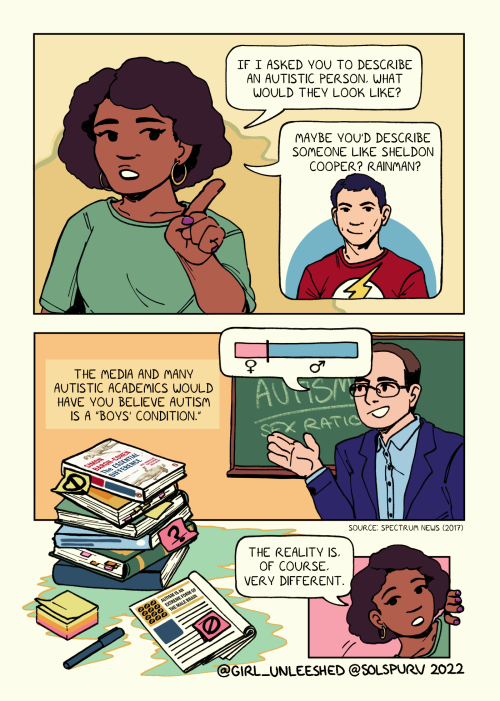
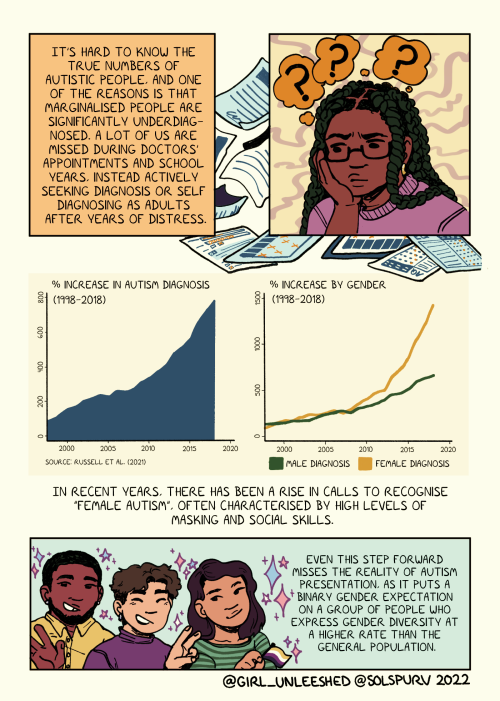
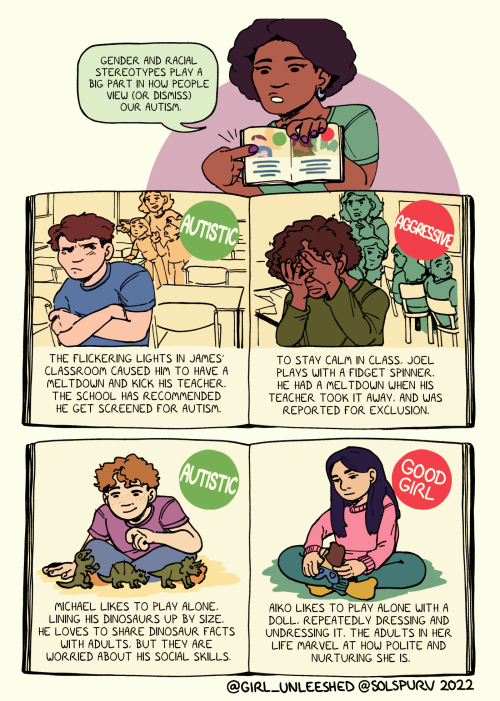

“The focus on cis white male presentations of autism creates a massive diagnosis barrier for marginalised people. Our actions are viewed differently depending on our race / gender etc. We need better representation in media and we need academics to understand and embed cultural nuance, not seek to further restrict diagnosis.” (@girl_unleeshed on Twitter)
Here’s the second comic I worked on for Autism Acceptance month! This comic is a collaboration with Leesha (@girl_unleeshed). Please check out her Twitter to read more of her awesome and thoughtful writing!

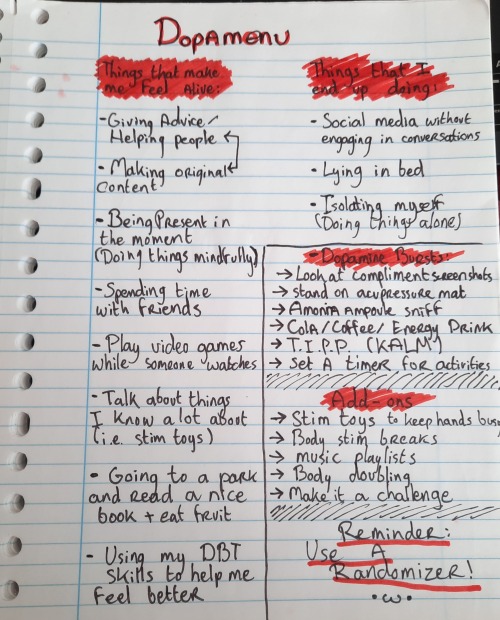
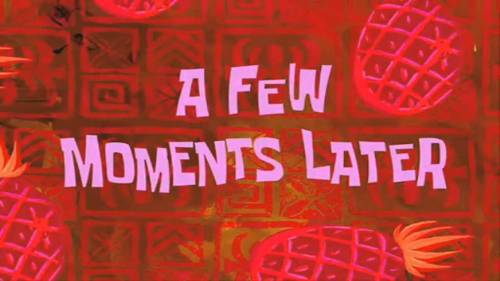
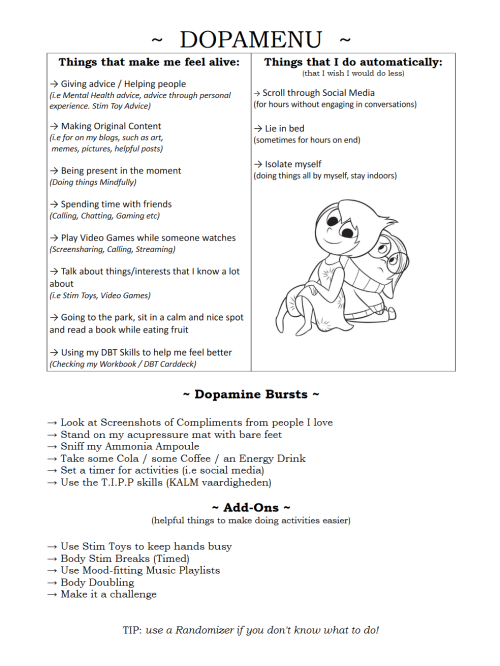
Are you having a hard time keeping yourself and your brain stimulated? Can you even stimulate yourself at all? Maybe you should try making a Dopamenu!
I made a Dopamenu today by following How To ADHD’s guide.
How To Give Your Brain The Stimulation It Needs (Dopamenu Guide!)
I recommend watching the video and trying to make yourself a Dopamenu as well. I used OpenOffice to make my Dopamenu, it’s a free alternative to Word and it works pretty much the same!
LINK TO MY GOOGLE DRIVE SO YOU CAN GET THE FILE & FILL IN YOUR OWN DOPAMENU YOURSELF


From what I’ve read and observed, bipolar symptoms exist on a spectrum. Using these charts inspired by @levianta’s graphics about autism, you can visualize the extremity of every symptom you experience. As an example, here is a chart visualizing how i personally experience hypomania:

-
 januskills liked this · 1 week ago
januskills liked this · 1 week ago -
 thadymiller reblogged this · 1 week ago
thadymiller reblogged this · 1 week ago -
 a1sart liked this · 2 weeks ago
a1sart liked this · 2 weeks ago -
 a1sart reblogged this · 2 weeks ago
a1sart reblogged this · 2 weeks ago -
 loolybool liked this · 2 weeks ago
loolybool liked this · 2 weeks ago -
 sleepyshroud156651 reblogged this · 2 weeks ago
sleepyshroud156651 reblogged this · 2 weeks ago -
 sleepyshroud156651 liked this · 2 weeks ago
sleepyshroud156651 liked this · 2 weeks ago -
 its-arson-time reblogged this · 2 weeks ago
its-arson-time reblogged this · 2 weeks ago -
 woundedhealer-journey liked this · 2 weeks ago
woundedhealer-journey liked this · 2 weeks ago -
 that-good-ol-fashioned-mothgirl reblogged this · 2 weeks ago
that-good-ol-fashioned-mothgirl reblogged this · 2 weeks ago -
 your-favourite-aunt liked this · 3 weeks ago
your-favourite-aunt liked this · 3 weeks ago -
 oozequeen liked this · 3 weeks ago
oozequeen liked this · 3 weeks ago -
 shineypebble reblogged this · 3 weeks ago
shineypebble reblogged this · 3 weeks ago -
 shineypebble liked this · 3 weeks ago
shineypebble liked this · 3 weeks ago -
 speedsketch liked this · 3 weeks ago
speedsketch liked this · 3 weeks ago -
 verathena14 reblogged this · 3 weeks ago
verathena14 reblogged this · 3 weeks ago -
 zaycheese reblogged this · 3 weeks ago
zaycheese reblogged this · 3 weeks ago -
 zaycheese liked this · 3 weeks ago
zaycheese liked this · 3 weeks ago -
 hoodoo-haven reblogged this · 3 weeks ago
hoodoo-haven reblogged this · 3 weeks ago -
 zoogle22 liked this · 3 weeks ago
zoogle22 liked this · 3 weeks ago -
 scoutwolf liked this · 3 weeks ago
scoutwolf liked this · 3 weeks ago -
 abrushstrokeofsilver liked this · 3 weeks ago
abrushstrokeofsilver liked this · 3 weeks ago -
 elminoth liked this · 3 weeks ago
elminoth liked this · 3 weeks ago -
 givemeafuckingbreakorurgay liked this · 3 weeks ago
givemeafuckingbreakorurgay liked this · 3 weeks ago -
 starfeatherderg liked this · 3 weeks ago
starfeatherderg liked this · 3 weeks ago -
 ato-khsz reblogged this · 3 weeks ago
ato-khsz reblogged this · 3 weeks ago -
 ato-khsz liked this · 3 weeks ago
ato-khsz liked this · 3 weeks ago -
 nintendo-switch-2 reblogged this · 3 weeks ago
nintendo-switch-2 reblogged this · 3 weeks ago -
 nooneishereshh reblogged this · 3 weeks ago
nooneishereshh reblogged this · 3 weeks ago -
 sobbing-quietly02 reblogged this · 3 weeks ago
sobbing-quietly02 reblogged this · 3 weeks ago -
 sobbing-quietly02 liked this · 3 weeks ago
sobbing-quietly02 liked this · 3 weeks ago -
 adventure-of-snail reblogged this · 3 weeks ago
adventure-of-snail reblogged this · 3 weeks ago -
 adventure-of-snail liked this · 3 weeks ago
adventure-of-snail liked this · 3 weeks ago -
 charascarlet reblogged this · 3 weeks ago
charascarlet reblogged this · 3 weeks ago -
 scoobys-sith-cousin liked this · 3 weeks ago
scoobys-sith-cousin liked this · 3 weeks ago -
 torpetavantas reblogged this · 3 weeks ago
torpetavantas reblogged this · 3 weeks ago -
 torpetavantas liked this · 3 weeks ago
torpetavantas liked this · 3 weeks ago -
 nightyraven-art reblogged this · 3 weeks ago
nightyraven-art reblogged this · 3 weeks ago -
 nightyraven-art liked this · 3 weeks ago
nightyraven-art liked this · 3 weeks ago -
 mangetsuame liked this · 3 weeks ago
mangetsuame liked this · 3 weeks ago -
 fizzywigs liked this · 3 weeks ago
fizzywigs liked this · 3 weeks ago -
 amberstone-16 liked this · 3 weeks ago
amberstone-16 liked this · 3 weeks ago -
 eliunderscore liked this · 3 weeks ago
eliunderscore liked this · 3 weeks ago -
 liamket reblogged this · 3 weeks ago
liamket reblogged this · 3 weeks ago -
 20-dollar-yard-sale-gnome reblogged this · 3 weeks ago
20-dollar-yard-sale-gnome reblogged this · 3 weeks ago -
 20-dollar-yard-sale-gnome liked this · 3 weeks ago
20-dollar-yard-sale-gnome liked this · 3 weeks ago -
 oswildin liked this · 3 weeks ago
oswildin liked this · 3 weeks ago -
 the-fandom-hopping-mage reblogged this · 3 weeks ago
the-fandom-hopping-mage reblogged this · 3 weeks ago




